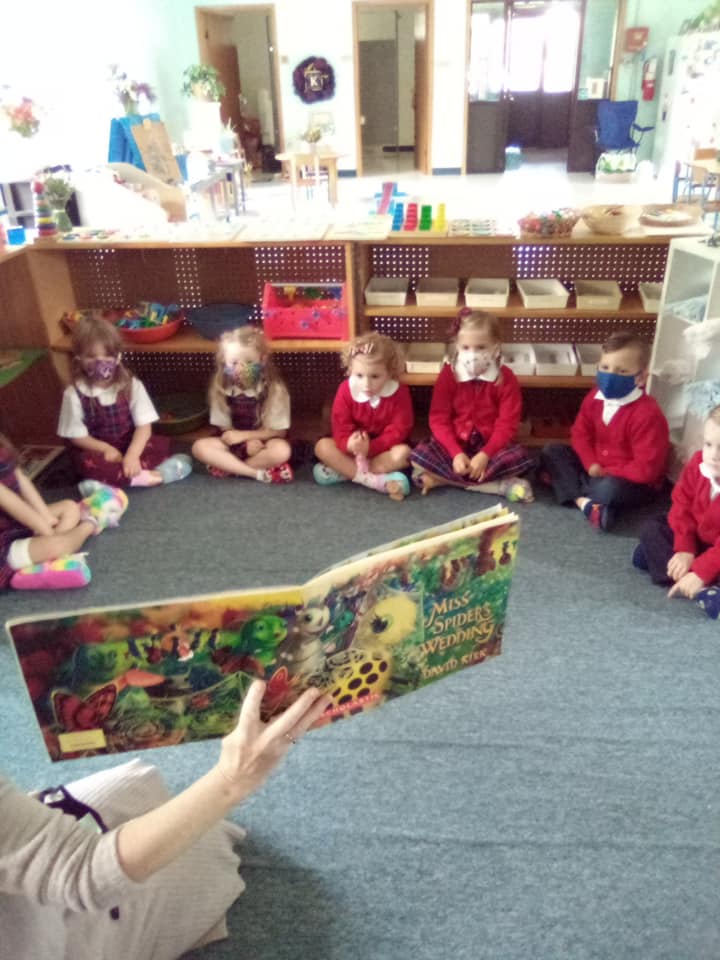We provide a stimulating educational environment that encourages children to explore new concepts and ideas within a developmentally appropriate Montessori curriculum. The development of respect, inner discipline and self-direction are important objectives. Both group and individualized instruction is used to help each child develop social and cognitive skills.
Montessori Curriculum Guide
| Language Arts | Social Studies |
| Listening | School |
| Oral Communication | Family |
| Phonics | Holidays |
| Printing Letters | Community Helper |
| Preparation of Reading Games | Geography and Cultures |
| Reading | Sensitivity to Diversity |
| Mathematics | Science |
| Visual Discrimination | Life Science |
| Number and Number Theory | Physical Science |
| Measurement | Earth and Space |
| Intro to Geometry | |
| Music | |
| Art | Expression |
| Self Expression | Timbre |
| Appreciation | Melody/Harmony |
| Drawing | Rhythm |
| Painting | |
| Physcial Activity | |
| Gross Motor Play | |
| Cooperative |
Montessori Curriculum
Montessori classrooms are scientifically designed to help the student follow his or her search for knowledge while at the same time learning important social skills and knowledge of the larger world. This knowledge provides a foundation upon which the student will build throughout life.

Montessori classrooms are multi-aged settings where the younger students learn from social examples set by the older students and from observing presentations of more advanced lessons. This gives the younger students a peer-role model while at the same time the older students learn to develop leadership skills and understand the joy and responsibilities of mentoring. The Montessori classroom is in fact a microcosm of the worlds they will enter as youths and adults.
| TRADITIONAL MODEL | MONTESSORI MODEL |
|---|---|
| Teacher decides pacing of curriculum | Curriculum is paced according to student ability and interest |
| Students practice skills and memorize facts | Students practice skills in meaningful context and learn by doing |
| Content is broken down into discrete, sequential steps | Rigorous and intentional content areas are studied as meaningful wholes |
| Products are of primary importance (ie answers on tests) | The process of learning is honored foremost |
| Avoiding mistakes is important | Mistakes are an important key to learning |
| Performance on tests is highly valued | Tests meaningfully assess only a portion of overall learning |
| Teachers do the evaluating and grading | Student self-assessment plays a pivotal role |
| Learning is expected to be uniform | Each student learns in his or her own way and course |
| Focuses attention on what to learn | Attention is given to how students learn and why |
| Promotes genre and skill-based teaching | Promotes holistic and integrated learning |
Montessori classrooms are scientifically designed to help the student follow his or her search for knowledge while at the same time learning important social skills and knowledge of the larger world. The Montessori classroom are muti-aged settings where the younger students learn from social examples set by older students and from observing presentations of more advanced lessons. This gives the younger students a peer-role model while at the same time the older students learn to develop leadership skills and understand the joy and responsibilities of mentoring.
We at Kinder Garden Montessori School look at your child as an individual no a test score. We have a firm respect for each child as an individual. Often in a traditional preschools, all students are expected to learn new concepts the same way. Our Montessori approach assures children learn in different ways. To help each child reach his or her individiaul potential, we focus on developing the whole child–socially, emotionally, physically, and congitively.
At Kinder Garden Montessori School, we place a high value on teaching children how to learn themselves. Out students are encouraged to reach their highest potential at their own individual pace. In traditional classrooms, students follow the same lessons leaving some children behind and others pull ahead. In our classroom, students challenge themselves when they are reay, developing greater self-sufficiency and personal independence, and building an internal sense of purpose and motivation.
Ultimatley, the question of whether a montessori or traditional school is better comes down to personal opinion, values, and much more. Parents who place more value on their children developing independence, accountability, and having an opportunity to foster their strengths, often feel that a Montessori education is the best fit.